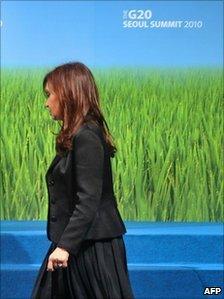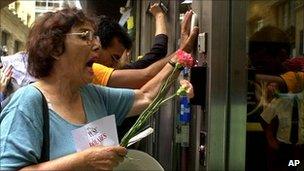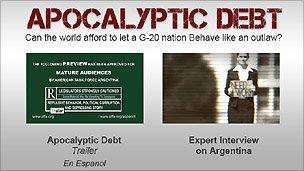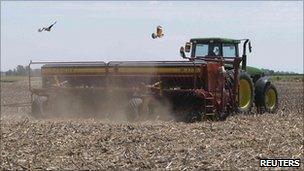Argentina still tackling debt burden
- Published

President Fernandez is still in mourning for her husband
While the EU and the International Monetary Fund (IMF) were working out how to bail out the Irish Republic, Argentina was providing another timely reminder of what could have happened if they had failed.
Last week, in its usual wilful way, the government in Buenos Aires took another modest step towards overcoming the legacy of the country's 2001-02 economic meltdown.
Argentina has long since recovered from the economic slump and social unrest that came in the wake of the peso's collapse.
But the consequences of its $102bn debt default persist, with the government denied access to world credit markets.
Argentina has already struck deals with the majority of its creditors. Yet before it can raise new loans, it needs to settle its outstanding debts, most of which are held by the informal Paris Club group of lenders which represents 19 of the world's largest economies.
Back in September 2008, President Cristina Fernandez de Kirchner pledged to pay off, in one go, the entire debt owed to the Paris Club, amounting to about $6.5bn.
As the global financial crisis intensified, however, the government quietly put that promise on ice, since it would have had to use foreign exchange reserves that might have been needed to prop up the economy.
Now President Fernandez says the Paris Club has agreed to fresh negotiations on repaying the money.
"This is the only way that Argentina can settle its debts," she said in a televised address to the nation.
IMF still blamed
To President Fernandez's great satisfaction, the talks will take place without the involvement of the IMF, which Argentina has shunned since 2006.
The IMF is widely blamed by Argentines for triggering their country's financial turmoil in 2001 by not disbursing promised funds.
"The rules of the Paris Club demand the IMF's participation in the plans," President Fernandez said in her address.
"Finally the club has accepted not to do it."

Argentina's 2001-02 financial crisis led to street protests
If the talks bear fruit, it will be the third stage in Argentina's long battle to shake off its pariah status and rejoin the international financial community.
The first and biggest phase came under President Fernandez's late husband and predecessor, Nestor Kirchner.
In March 2005, his administration persuaded 76% of creditors to accept a debt swap that reduced the value of their bond holdings by nearly two-thirds.
President Fernandez herself oversaw another restructuring in June this year that left just 8% of the original bad debt outstanding.
G20 status doubts
For many people, the most peculiar aspect of Argentina's behaviour is that it has been able to scorn the IMF and impose severe haircuts on its creditors while being treated as one of the world's foremost economic powers.
Unlike the Irish, the Argentines have a seat at the table of the G20 and therefore a right to help shape international financial architecture at a critical time for the global economy.
Some observers have publicly questioned whether Argentina should have that right.

US creditors have called for Argentina to be removed from the G20
At the time of the first G20 summit in Berlin in 1999, it was the world's 16th-largest economy. But its economic woes have sent it plunging down the list, so that it is now struggling to stay in the top 30.
The G20's own website stresses that "there are no formal criteria for G20 membership", but adds: "In a forum such as the G20, it is particularly important for the number of countries involved to be restricted and fixed, to ensure the effectiveness and continuity of its activity."
In other words: once a member, always a member, even if your circumstances change dramatically. And hold back on admitting new members.
One lobby group, the American Task Force Argentina, representing US creditors who refused to accept the government's debt-swap programmes, has campaigned to have Argentina expelled from the G20, but to no avail.
Figures fiddled?
So how is Argentina faring at home, if international credit is not forthcoming?
Government figures suggest that the economy is still growing healthily, thanks to a strong performance by the farming sector. Soyabean and grain harvests have set records at a time when soaring world demand has pushed up prices.

Argentina is the world's number three soybean supplier
The trouble is that the government's economic statistics are being openly disputed by many reliable analysts, who allege that the data has been deliberately manipulated.
"The [Argentine] authorities have been releasing whitewashed GDP, production and inflation data, partly so that holders of inflation-linked government bonds will be short-changed and partly for political gain," the survey organisation Consensus Economics flatly stated in a recent digest of forecasts.
It said that Argentina probably suffered a recession last year, but official figures recorded GDP growth of 0.9%.
The government has predicted 9% growth for 2010, while Consensus Economics expects a more modest 7.8%.
Budget belligerence
If Argentina does pay off its outstanding Paris Club debt, it will have to raid the central bank's reserves for the necessary cash.
Provision for this was included in the country's 2011 budget, which has to be passed by Congress before its current session closes at the end of this month.
But the measures have prompted a furious response from opposition members and led to angry scenes in parliament.
Last week, the disagreement turned violent when Graciela Camano, part of a group that broke away from the governing Peronists and joined the opposition, slapped pro-government congressman Carlos Kunkel in the face.
Argentine budget debate descends into violence
With the 2011 budget now unlikely to pass in time, it seems probable that President Fernandez will have to sign an emergency decree allowing her to carry over and extend this year's budget.
But there may be trouble ahead in any case. The 2011 budget submitted to Congress was based on a rise in GDP of 4.3% for next year, which would mean a sharp slowdown from this year's growth rate.
At the same time, the predicted 2011 inflation rate was set at 8.9%, down from the current official year-on-year rate of roughly 11%, while many analysts believe the true rate is more like 25% and likely to go even higher.
All this comes as President Fernandez is still reeling from the loss of her husband, who died nearly a month ago of a heart attack at the age of 60.
Given the personality-driven nature of Argentine politics, the passing of Mr Kirchner leaves his widow bereft of both her partner and her ideology, "kirchnerismo".
With a presidential election due in October next year, Cristina Fernandez is well ahead in opinion polls at the moment, should she choose to run again.
But if the economy comes unstuck before then, the race could tighten rapidly.
- Published2 November 2010
- Published27 October 2010
- Published30 October 2010
- Published27 October 2010
- Published27 October 2010
- Published27 October 2010
- Published27 October 2010